- Home
- J. F. Penn
Tree of Life Page 3
Tree of Life Read online
Page 3
“The shaman passed his gourd for me to drink and as night fell, the other villagers gathered around. Strong men with limbs like the trees, women at one with the rainforest. We sang songs of our ancestors under the full moon and welcomed the Goddess into our midst. I entered the upper realms that night and you were planted within me.”
She grasped Aurelia’s hand, her grip suddenly tight. “I know it, for when I woke the next morning, the shaman still sat by the fire. This time, he smiled at me before placing a hand on my belly.”
Aurelia frowned. “So, who was my father?”
Her mother shook her head. “It doesn’t matter whose seed you came from. You were born through me. You are a true child of the rainforest, a pure soul of the trees made flesh.”
She pointed out the window toward the scar of the deep mine. “You were born to avenge the rainforest, but your father must never know of your lineage. I came out of the forest several weeks later and accepted his advances once more, but I knew you already grew within me. He considered you a miracle from his God, the one who teaches that man is the pinnacle of creation, but you truly are a child of Nature. When it is time, you must take your place and tear down all that he has built.”
Her mother died later that day, and her father made sure she had a proper Catholic burial with all the trappings of the religion Aurelia knew her mother hated. But she smiled to herself as the casket passed by, for her mother was not in that hard wooden box. Her spirit soared high above, drifting back into the rainforest, part of the Earth once more.
Soon after, Aurelia told her father she was going to Rio de Janeiro, to take some time out to think about her life.
He had waved her away, his focus on the latest iron ore figures from the mine. “Go. Spend what you like. Have a good time.” He looked up. “Find yourself a young man, have some fun.”
But Aurelia had not traveled to the big city for nights of pleasurable excess. She had journeyed deep into the Amazon in search of her true ancestry. The village her mother spoke of had been moved on by deforestation, but deep in the green, she found a shaman willing to share the gourd with her. By his age, he might have been the man her mother sat with, but he did not remember such things.
In the depths of her trance, Aurelia saw what the world could become without humanity’s pollution. An expanse of green with the flash of natural color from flowers and birds. Creatures living in harmony.
She would be the one to restore the Earth again.
After the rainforest, she had gone to Rio, but not to have fun. She spent months studying, learning, following a trail back to the European settlers of Brazil who wrote of a map to the Garden of Eden.
A sudden alarm sounded, interrupting her memories, the blaring din a warning of impending explosion.
Aurelia put her hands over her ears as the blast shook the house and echoed inside her head. Booming aftershocks rumbled through the ground, then the crash of rock collapsing, the roar of soil subsiding around it.
Another wound.
But this time, she relished the pain. It would be silenced soon enough.
At last, the noise subsided and there was a moment of silence before the giant trucks roared to life again. The manmade destruction would never stop unless she made it so.
Aurelia took a sip of her tea and separated the items on her plate. She would only eat half of each today. She trusted Mother Earth and it wouldn't be long until her body would return its energy to the rainforest where it belonged.
Her phone buzzed, and the screen lit up with a message from Amsterdam. The first piece was finally theirs.
Aurelia’s father had spent his life exploiting and destroying the natural world. She would spend hers restoring Nature to Her rightful place.
3
Belém, Lisbon, Portugal
Sunlight danced across the waters of the River Tagus, and the smell of salt came on the air from the Atlantic Ocean beyond. Morgan leaned back and closed her eyes for a moment, letting the balmy September sun warm her skin. It was only a short flight from Amsterdam, but Portugal felt like a different world. The culture was closer to her own Spanish heritage and the relaxed atmosphere of the beaches of Tel Aviv in Israel where she had grown up. Perhaps the sun melted away the sharp edges of the northern European personality here. She wished they had more time to get to know the place, but as ever, the mission marched on.
“I didn’t know that the Portuguese once had such an empire,” Jake said. He stood on the edge of a huge mosaic compass rose with a map of the world at its heart. Portuguese caravels roamed the marble oceans, ships in full sail marked with the red crosses of the Order of Christ. The date of discovery marked each significant port from the Cape of Good Hope on the Horn of Africa in 1488, to Goa, India in 1498 and on to Macau in the east in 1514. Traveling west, the Portuguese had reached Cananéia in 1502, claiming the land of Brazil for its empire.
“The Jews went with them,” Morgan said. “Some in their new lives as conversos, New Christians, and others fleeing with ancient texts, holding to the faith of their ancestors.”
She imagined the terror of heading out to sea on such a vast journey, afraid of what lay ahead but knowing that to leave was to live another day. Jews had found unexpected havens in the corners of the Portuguese Empire, but how were she and Jake to discover where to follow next?
“Impressive, isn’t it?”
Morgan looked up to see a young woman standing astride the depiction of the Caribbean islands. She had a long, dark braid woven with colorful silk flowers and she held a cardboard tray with three takeaway coffee cups and a bulging paper bag.
“Director Marietti sent me to help while you’re in Lisbon,” she said. “I’m Ines, a student of archaeology on an ARKANE scholarship. He also mentioned that you might appreciate some of these.” She raised the tray a little. “Coffee and the best pastéis de nata you’ll find, possibly in the world.”
Morgan strode across the mosaic of Latin America with enthusiasm. Black coffee was her one true addiction, and it was already turning out to be a long day.
“Thanks so much, Ines. You’re a lifesaver.” Morgan reached for the cup and took a sip.
Jake went for the pastries first, opening the paper bag with a crinkle. The smell of cinnamon and hot sugar wafted into the air as he pulled out a tiny, perfectly formed flaky pastry case with a deep yellow egg custard filling and caramelized sugar on top. Most of it disappeared in one bite, and Morgan couldn’t help but laugh at the pleasure on his face as Jake enjoyed the sweetness.
“Oh, these are good,” he said, going in for another bite.
“Belém is the traditional home of the pastel de nata,” Ines explained. “But they’ve spread all over the world now, and you can taste why.”
Morgan turned to point at the huge Padrão dos Descobrimentos, the Monument to the Discoveries, which rose high above them on the edge of the river. “Is that how they spread?”
Shaped like the prow of a caravel, the monument featured prominent Portuguese historical figures. Vasco da Gama, discoverer of the sea route to India; Ferdinand Magellan, first to circumnavigate the world; Pedro Álvares Cabral, discoverer of Brazil, and so many more, with Henry the Navigator at the prow looking out to sea. Every intricate carving had a distinct face, and each carried aspects of their lives — a sword, a cross, a manuscript, an astrolabe.
Ines led Morgan and Jake closer to the monument. “They carried our faith and our language — over 250 million people speak Portuguese around the world now — and you can even get an excellent pastel de nata in Macau.”
She stared out across the water, her expression suddenly wistful. “We have a word in Portuguese, saudade, considered almost impossible to translate as it has no exact English equivalent. It is part longing and nostalgia, a kind of homesickness, and also conveys a sense of loss. Imagine a caravel leaving this port. One lover stands on the deck, the other on this shore. Saudade is the tension between the departed and the left behind.”
“That�
�s beautiful.” Morgan looked up at the famous faces of the explorers. “It’s incredible how far the Portuguese traveled. How does a nation go from ruling so much of the known world to being an almost forgotten corner of Europe?”
Ines shrugged. “I know, it’s crazy. But every empire must fall. You live in England, so it must be the same there. A once great empire reduced to architecture, forgotten books, and memory.”
Morgan nodded. “I think the English still have delusions of grandeur on the world stage, but you’re right, empires must fall. The only question is how long they last and whether they realize they’re at the end.”
Jake gazed up at the figures. “And how many die at their hands,” he whispered.
Ines turned back toward the road. “It wasn’t just the far reaches of empire where my people slaughtered innocents. Come, I’ll take you into the city and show you the archives.”
She led them away from the busy tourist buses to a row of tuk-tuks, the three-wheeled auto-rickshaws used all over Asia but less common in Europe. Ines beckoned them over to one decorated with the same silk flowers she had wound in her plait.
“This is yours?” Morgan climbed into the tiny vehicle. Jake squeezed in next to her, his muscular frame pressing against her leg.
Ines patted the driver’s seat proudly. “I used some of my grant money to buy it and I earn extra cash when I’m not busy at the archives. Tourists love the tuk-tuks. They’re the fastest way to get around the city, that’s for sure.”
She pulled into the traffic and they sped off along the waterfront back toward the city. They passed through dilapidated areas with boarded up ruins and empty houses, as well as more industrial parts in what was still a busy port.
Morgan had second thoughts about Ines’s seemingly gentle nature as she darted in and out of the traffic, turning around to point things out and weaving away from cars at the last moment with a liberal use of her blaring horn.
Jake grinned as they sped past a colorful food market. “This is awesome. Perhaps we could convince Marietti to get us one for the London office?”
They soon pulled up in the center of the old city and parked at the back of a rank of tuk-tuks. Ines went to speak with some other drivers, her lively chatter evidence of her place in the community.
She returned to them a minute later. “Come, it’s this way.”
They walked the last few streets along the distinctive pavements of the old city, calçada portuguesa, a unique style of hand-cut and hand-laid stone in wavy patterns of dark and white, as if the river twisted inland. Bright hand-painted azulejos tiles dotted the facades of houses and shops above, brought to Portugal by the Moors of North Africa.
Lisbon was truly an eclectic mix of cultures, modern evidence of the Portuguese Empire which brought immigrants from former colonies in Asia, Africa and Latin America. As they passed, the sound of fado drifted out of a bar, sometimes called the Portuguese blues for its blend of lyrical fatalism and resilience against the odds, a lament for an irrecoverable past.
They rounded a final corner and entered a tree-lined plaza where locals sat drinking coffee in dappled light next to the walls of the Convent of Our Lady of Carmel. Ines spoke to the clerk on the tourist desk and she waved them all inside.
They emerged into the medieval remains of a once grand house of worship. Morgan looked up in wonder at what remained of slender columns leading up to arches in the plain Gothic style. Somehow it seemed even more like a house of God without a roof, as the blue sky above formed the true vault of Heaven. Faith could never be contained in buildings constructed by human hands, and no matter the beauty of the place, Morgan always felt closer to the ineffable in nature than in man’s creation. This ruined convent combined the best of both worlds.
“The 1755 earthquake destroyed this along with the great library,” Ines explained. “The military used it for a while and eventually, it was partially reconstructed but then the 1969 earthquake damaged it further.”
“Perhaps God prefers it this way,” Morgan said softly.
Ines led them on through the nave toward the far end of the convent, which housed the small Archaeological Museum. She pushed open the door and led them through the chapel of the old apse, explaining interesting things as they walked. Pieces of sculpture retained from the ruins, Gothic sarcophagi including the tomb of King Ferdinand I from the fourteenth century, and even Bronze Age spears and tools.
Morgan recognized something of her younger self in Ines, the keen interest in so many areas and the difficulty of choosing an area to focus on. She had felt that way back in training for the Israel Defense Force, but her husband Elian’s death in a hail of bullets on the Golan Heights had focused her search for meaning. She could only hope that Ines would not have to suffer such loss in order to find her true path.
“I’ve been working on a special project for ARKANE,” the young woman explained. “There are manuscripts here that date back to the Catholic archives of the Portuguese Inquisition and even the Lisbon Massacre of 1506.”
Jake frowned. “I always thought the Inquisition was Spanish?”
Morgan gave a rueful smile. “Fanaticism knows no borders.”
Ines led them on into an unusual chamber. Wooden bookshelves densely packed with leather-bound volumes lined the high stone walls. An Egyptian mummy lay in a painted sarcophagus dated from the second century BCE. Two sixteenth-century Peruvian mummies sat entombed in glass cases, hunched over with bound legs and shrunken, leathery flesh. It was a macabre room of vellum, bone and parchment, a contrast to the sanctuary of stone outside in the fresh air.
The chamber grew dark as clouds passed over the sun beyond the windows, and Morgan shivered a little at the dead flesh before her. It was nothing like the mummy crypt in Palermo where she and Jake had sought the Devil’s Bible, but somehow this place had a truly grim atmosphere.
Ines opened one of the glass-fronted bookshelves and pulled out a heavy tome. Jake helped her heft it onto the top of the Egyptian mummy case, and she opened it to a section on the Lisbon Massacre.
“I wanted you to see this. The words of a monk who witnessed hundreds of Jews tortured, beaten to death by the mob or burnt at the stake at Rossio Square, just down the road.”
Morgan walked over to the bookcase and stared in at the volumes. The ashes of the pyre of the library in Amsterdam were nothing to the number of Jews burned here in Lisbon and those countless souls immolated all over Europe across the generations. Most knew of the Holocaust, but pogroms were common all over the continent as her people were blamed for everything from plague to economic ruin.
She took a deep breath and turned back as Jake bent over the manuscript to look more closely at a page displaying a hand-drawn map. The illustration was similar to the Portuguese Empire on the wall of the Rabbi’s office.
“Many of the New Christians, or conversos, who survived left after the massacre,” Ines explained. “Any remaining escaped when the Portuguese Inquisition was established thirty years later. Of course, its influence spread throughout the empire, but some Jews found a haven in the colonies.”
“We’re looking for pieces of a particular manuscript,” Morgan said. “Why would this help?”
Ines pointed to the map. “Look closer.”
Morgan walked to the other side of the sarcophagus and bent over the tome.
Jake leaned back a little to let her see and pointed to a tiny sketch next to a line of ships sailing away from the coast. “Look familiar to you?”
It was a tiny illustration made by the hand of someone with great skill depicting curled vines with sharp spikes and crimson flowers.
“The word next to it,” Ines said softly. “Hortus.”
“The Latin word for garden,” Morgan finished for her as she looked down at the caravels sailing east. “Then we will follow the same path.”
They walked back outside together and as a taxi pulled up, Morgan smiled at Ines. “Come to the London ARKANE office sometime. I’d love to show you what we ha
ve in our archives. I think you would find it fascinating.”
Ines beamed with enthusiasm. “I’d love that, thank you. I’ll put a request in after the summer break.”
Frik Versfeld pulled his baseball cap lower over his forehead, his eyes hidden from view by designer mirrored sunglasses as he gazed at the man who stood only meters away outside the convent walls. It took everything he had to rein in the anger that surged inside as he focused on the man’s features.
It had to be him. Jake Timber.
Frik raised a hand to touch his throat, fingertips brushing the ugly scars that still marred his body even after countless grafts and surgery. He was a monster because of what Jake had done years ago and he had dreamed of revenge for so long, but Jake had disappeared off grid. What was he doing here now?
Frik raised his phone and took several photos of the convent walls, as any tourist might do, but he made sure to get Jake and the two women with him in the frame.
As Jake stepped into a taxi with the older woman, Frik followed the younger one as she walked away. His fingers itched to wrap around her slim neck. She would tell him what they had found within the convent and where Jake would go next. Aurelia had ordered him to find the Jewish archive in Lisbon as a way forward in their search for the map to Eden, but now, it seemed, he might be able to settle a more personal score along the way.
4
Every step he took in this sacred place was one step closer to Heaven. Guram gritted his teeth against the pain as the burning coals seared the flesh on the bottom of his feet, and he forced himself not to run. The way of the Ignis Flammae was the path of flame, and if he could not bear this temporal agony, how could he ever expect to fight for the cause against the forces of ever-growing darkness in the world above.
The smell of burning flesh wafted through the air, tainting the incense that rose in eddies around the Brothers. They lined the edge of the trench of hot coals and chanted the words of the prophet Isaiah, chapter 43.

 Valley of Dry Bones
Valley of Dry Bones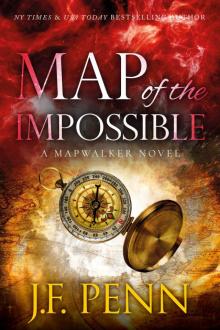 Map of the Impossible
Map of the Impossible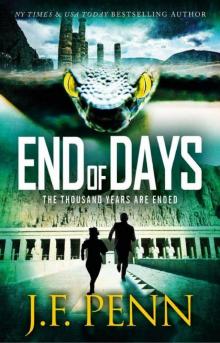 End of Days
End of Days Sins of Violence
Sins of Violence Day of the Vikings
Day of the Vikings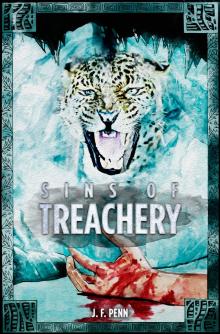 Sins of Treachery
Sins of Treachery A Mapwalker Trilogy
A Mapwalker Trilogy Desecration
Desecration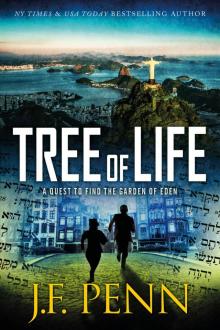 Tree of Life
Tree of Life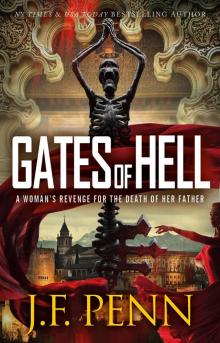 Gates of Hell
Gates of Hell Map of Shadows
Map of Shadows Risen Gods
Risen Gods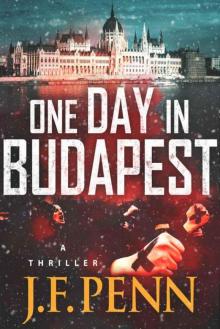 One Day In Budapest
One Day In Budapest Delirium (London Psychic)
Delirium (London Psychic) Day of the Vikings. A Thriller. (ARKANE)
Day of the Vikings. A Thriller. (ARKANE) Pentecost. An ARKANE Thriller (Book 1)
Pentecost. An ARKANE Thriller (Book 1) Deviance (The London Psychic Book 3)
Deviance (The London Psychic Book 3) Prophecy. An ARKANE thriller. (Book 2)
Prophecy. An ARKANE thriller. (Book 2)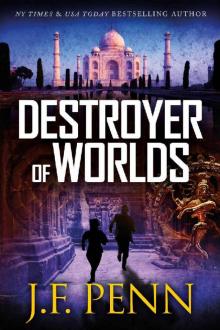 Destroyer of Worlds (ARKANE Book 8)
Destroyer of Worlds (ARKANE Book 8)